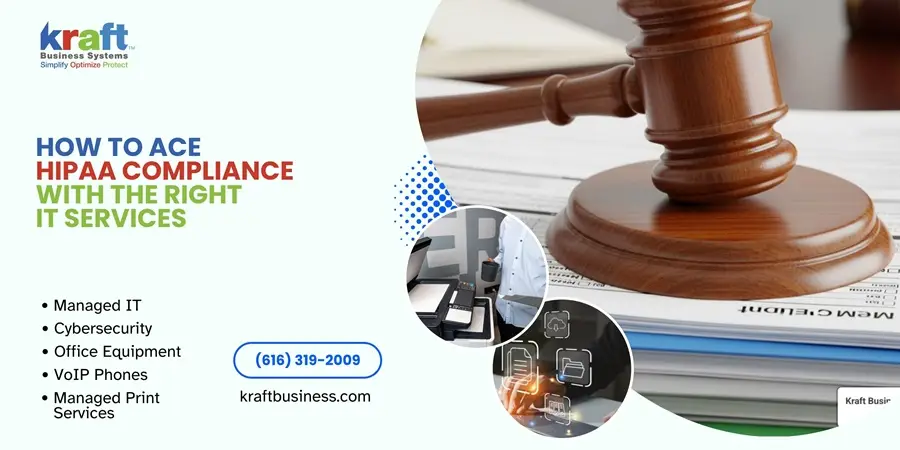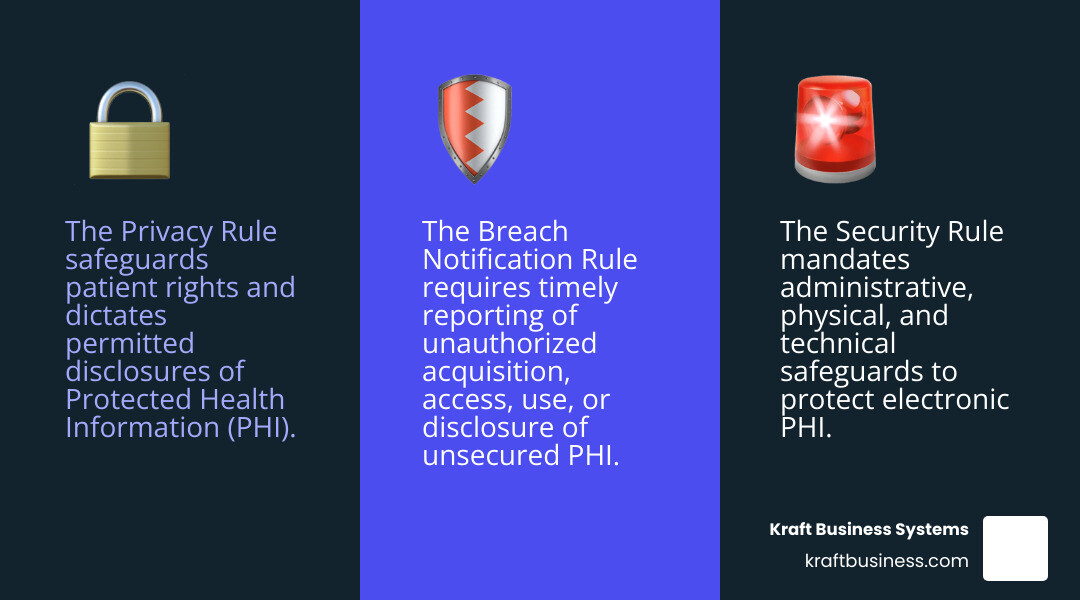AI Overview:
HIPAA compliance isn’t just about checking regulatory boxes—it’s about protecting patient trust, avoiding crippling fines, and building a secure digital foundation for healthcare. With 79% of healthcare organizations suffering at least one data breach within two years and breach costs averaging $4.8M per incident, specialized IT services are no longer optional. They’re the frontline defense.
IT Services for HIPAA Compliance: Ace Security 2025
Why HIPAA Compliance Depends on the Right IT Strategy
IT services for HIPAA compliance are specialized technology solutions that help healthcare organizations protect patient data and meet federal regulations. Here’s what you need to know:
Essential IT Services for HIPAA Compliance:
- Risk Assessments – Annual security evaluations to identify vulnerabilities
- Data Encryption – Protecting patient information at rest and in transit
- Access Controls – Role-based permissions and multi-factor authentication
- Network Security – Firewalls, secure Wi-Fi, and endpoint protection
- Backup & Recovery – Ensuring data availability and business continuity
- Employee Training – Security awareness and phishing prevention
- 24/7 Monitoring – Continuous threat detection and incident response
Healthcare organizations face a stark reality: 79% experience at least one data breach within two years, and the average cost of a HIPAA breach reached $4.8 million in 2021. These aren’t just numbers – they represent real practices that have struggled to recover from devastating cyberattacks.
The challenge isn’t just about having secure technology. It’s about creating a comprehensive compliance program that addresses HIPAA’s complex requirements while allowing your team to focus on patient care.
Many healthcare providers assume their EHR software handles all compliance needs. This is a dangerous misconception. HIPAA compliance requires a holistic approach that includes administrative safeguards, physical security measures, and ongoing risk management – areas where specialized IT services become essential.
The good news? You don’t have to steer this alone. The right IT partner brings expertise, proven processes, and dedicated support to transform HIPAA compliance from a constant worry into a competitive advantage.
It services for hipaa compliance terms explained:
- IT compliance for healthcare
- it compliance and risk management
- information technology audit services
Understanding HIPAA: The Stakes and Safeguards
When Congress passed HIPAA in 1996, they created more than just another healthcare law – they established a fortress around patient privacy that every healthcare organization must maintain. Think of HIPAA as your practice’s security blueprint, designed to protect the most sensitive information your patients entrust to you.
The heart of HIPAA revolves around Protected Health Information (PHI) – essentially any health data that could identify a specific patient. This isn’t just medical records; it includes everything from appointment schedules and billing information to lab results and even photos taken for treatment purposes. If it relates to someone’s health and can identify them, it’s PHI.
HIPAA casts a wide net when it comes to who must comply. Covered Entities include the obvious players – hospitals, clinics, health plans, and healthcare clearinghouses. But here’s where it gets interesting: Business Associates must also comply. This means any vendor, contractor, or service provider that handles PHI on behalf of a covered entity needs to follow the same strict rules.
This is where IT services for HIPAA compliance become crucial. Your IT partner isn’t just fixing computers – they’re handling some of your most sensitive data and must be held to the same standards as your clinical staff. For comprehensive guidance on this topic, check out our healthcare IT compliance services.
The government takes HIPAA seriously, and the numbers prove it. The Department of Health and Human Services provides detailed guidance through the official HIPAA Security Rule, which serves as the technical roadmap for protecting electronic health information.
The Core HIPAA Rules Explained
HIPAA isn’t one massive rule – it’s actually three interconnected regulations that work together like a three-legged stool. Remove any one, and the whole thing falls apart.
The Privacy Rule is often called the “patient rights” rule because it puts patients in control of their health information. It dictates who can see PHI, when it can be shared, and gives patients the right to access and correct their records. The Privacy Rule also defines permitted disclosures – those rare situations where you can share PHI without patient authorization, such as for treatment, payment, or public health emergencies.
The Security Rule is where technology meets regulation. This rule requires administrative safeguards (like security training and workforce management), physical safeguards (controlling access to computers and servers), and technical safeguards (encryption, access controls, and audit logs). The Security Rule is particularly relevant for IT services because it translates legal requirements into specific technical controls.
The Breach Notification Rule kicks in when things go wrong. If PHI is compromised, this rule requires organizations to notify affected patients within 60 days, report to the government, and in cases affecting more than 500 people, notify the media. The Breach Notification Rule turns a bad situation into a potential public relations nightmare if not handled properly.
Understanding these rules is essential, but implementing them correctly requires expertise. That’s why many practices turn to specialized providers for guidance – you can learn more about what small practices specifically need to know in our article on four things small healthcare practices need to know about HIPAA.
The High Cost of Non-Compliance
Let’s be honest – HIPAA violations hurt in ways that go far beyond writing a check to the government. The financial penalties alone can be devastating, ranging from $100 to $50,000 per violation, with annual maximums reaching $1.5 million. But that’s just the beginning of your troubles.
Data breach costs average $4.8 million per incident in healthcare – a figure that includes investigation costs, patient notification, credit monitoring, legal fees, and potential lawsuits. These aren’t theoretical numbers; they represent real practices that have faced financial ruin after a single security incident.
Reputational damage might be even more costly in the long run. Healthcare is built on trust, and once patients lose confidence in your ability to protect their information, they take their business elsewhere. Word travels fast in communities, and recovering from a damaged reputation can take years.
The government doesn’t just fine you and walk away. Corrective action plans require organizations to implement extensive oversight and monitoring, often for years after a violation. In extreme cases, individuals can face criminal charges including imprisonment for willful neglect or intentional disclosure of PHI.
Here’s a sobering reality: human error contributes to a significant portion of healthcare data breaches. Misconfigured systems, accidental emails to wrong recipients, and inadequate staff training create vulnerabilities that cybercriminals exploit. This highlights why comprehensive IT services for HIPAA compliance aren’t just about technology – they’re about creating a culture of security awareness throughout your organization.
The good news? These risks are manageable with the right approach and expertise. Working with experienced IT professionals who understand both healthcare workflows and HIPAA requirements can transform compliance from a constant worry into a competitive advantage.
The Core Role of IT Services for HIPAA Compliance
Think of IT services for HIPAA compliance as your practice’s digital immune system. Just as your body’s immune system works around the clock to prevent illness, specialized IT services continuously protect your patient data from threats you might never see coming.
In today’s healthcare landscape, IT isn’t just the person you call when your computer crashes. It’s become the backbone of secure patient care. When we talk about proactive security, we mean identifying vulnerabilities before hackers do. It’s like having a security guard who walks the perimeter every night, checking for open uped doors and broken windows.
The financial benefits are compelling too. While investing in comprehensive IT services requires upfront resources, it’s dramatically less expensive than dealing with a data breach. $4.8 million average breach cost we mentioned earlier? That’s enough to fund robust IT security for decades.
Here’s where things get interesting: HIPAA compliance operates on what we call a shared responsibility model. Think of it like a relay race. Your healthcare organization holds the baton of ultimate responsibility, but your IT service provider runs a crucial leg of that race, handling the complex technical safeguards that protect electronic PHI. This partnership frees your medical staff to focus on what they do best – caring for patients – while experts handle the intricate world of cybersecurity and compliance. This collaborative approach forms the foundation of effective IT Compliance and Governance.
Why Partner with a Managed Service Provider (MSP)?
Managing HIPAA compliance in-house is like trying to be your own lawyer, accountant, and IT department all at once. It’s technically possible, but is it the best use of your time and expertise? For most healthcare practices, especially smaller ones, partnering with a Managed Service Provider transforms a constant headache into a strategic advantage.
The access to expertise alone makes this partnership invaluable. At Kraft Business Systems, our team across Michigan – from Grand Rapids to Detroit, Ann Arbor to Lansing – lives and breathes healthcare IT compliance. While your internal team might encounter HIPAA challenges occasionally, we deal with them every single day. It’s the difference between a weekend golfer and a professional – both can play the game, but one has dedicated their career to mastering it.
Reduced operational burden means your staff can stop playing IT firefighter and get back to patient care. When your nurse isn’t troubleshooting network issues or your office manager isn’t researching encryption standards, they’re doing what they were hired to do. Gartner research shows that by 2025, 70% of businesses will outsource at least one critical IT function – and healthcare is leading this trend for good reason.
The scalability factor is particularly crucial in healthcare. Maybe you’re adding a new location, implementing telemedicine, or expanding your services. An MSP can adapt your IT infrastructure quickly without the lengthy hiring process or expensive equipment purchases that come with building internal capacity.
Perhaps most importantly, an MSP brings an unbiased technical perspective. Internal teams sometimes develop blind spots or feel pressure to avoid rocking the boat with expensive recommendations. An external partner can objectively assess your HIPAA compliance gaps and address them based purely on technical merit and regulatory requirements.
Our 24/7 monitoring means cyber threats are detected and neutralized even while you sleep. Healthcare data is valuable to criminals precisely because medical facilities often have limited after-hours security monitoring. Our comprehensive approach is detailed in our Managed IT Services offerings.
Bridging the Gap Between Technology and Regulation
Here’s where things get tricky: HIPAA regulations are written by lawyers, but they need to be implemented by technologists. It’s like having a recipe written in French that needs to be cooked by someone who only speaks English. The translation process is where many healthcare organizations stumble.
Translating legal requirements into technical controls requires specialized knowledge that spans both domains. When HIPAA requires “appropriate” access controls, what does that actually mean for your network configuration? When it mandates audit trails, which specific logs need to be captured and how long must they be retained?
Staying current with evolving threats is a full-time job in itself. Cybercriminals constantly develop new attack methods, while regulations evolve to address emerging risks. Your internal team is already managing patient care systems, electronic health records, and daily operational needs. Adding comprehensive threat intelligence monitoring to their responsibilities often means something important falls through the cracks.
Implementing best practices goes beyond just meeting minimum compliance requirements. We apply industry-leading security frameworks that not only satisfy HIPAA mandates but position your practice for long-term success. This includes everything from network architecture decisions to system configuration standards that align with HIPAA’s administrative, physical, and technical safeguards.
Vendor management presents another complex challenge. Every software provider, cloud service, and third-party tool in your environment needs proper Business Associate Agreements and ongoing compliance monitoring. We help steer these relationships, ensuring your entire technology ecosystem maintains HIPAA standards.
The goal is proactive risk mitigation rather than reactive crisis management. Our dedicated compliance professionals focus on identifying and addressing gaps before they become headlines. This forward-thinking approach, backed by years of specialized experience, provides the comprehensive protection detailed in our IT Compliance Risk Management Services.
Essential IT Services to Ensure HIPAA Compliance
When it comes to HIPAA compliance, having the right IT services for HIPAA compliance isn’t just about checking boxes—it’s about creating a comprehensive shield around your patient data. At Kraft Business Systems, we’ve seen too many practices scramble after realizing their patchwork approach to security left dangerous gaps.
Think of HIPAA compliance like building a house. You need a solid foundation (risk assessments), strong walls (technical safeguards), a reliable roof (data integrity), and ongoing maintenance (support and training). Skip any piece, and the whole structure becomes vulnerable. That’s why our approach to Cybersecurity Solutions addresses every critical component.
The beauty of working with an experienced IT partner is that we handle the complex technical details while you focus on what matters most: patient care. Let’s walk through the essential services that form the backbone of effective HIPAA compliance.
Comprehensive Risk Assessments and Management
Every successful HIPAA compliance program starts with knowing exactly where you stand. A Security Risk Assessment (SRA) is like getting a complete physical for your IT infrastructure—it reveals both the obvious problems and the hidden issues that could cause serious trouble down the road.
HIPAA requires periodic assessments, and industry best practice calls for annual reviews or whenever you make significant changes to your IT environment. It’s not enough to assume everything is working properly; you need to verify it regularly.
Our comprehensive approach begins with vulnerability identification, where we carefully examine your networks, systems, and applications for weaknesses. We look at how PHI flows through your organization—where it’s created, stored, transmitted, and eventually disposed of. This detective work often reveals surprising pathways that many practices don’t even realize exist.
Penetration testing takes this a step further by simulating real cyberattacks against your systems. Think of it as a friendly burglar trying to break into your house to show you where the locks need upgrading. Our experts use the same techniques as actual cybercriminals, but with the goal of strengthening your defenses rather than exploiting them.
Once we identify vulnerabilities, we develop clear remediation plans that prioritize the most critical risks first. We don’t just hand you a scary report and walk away—we work alongside your team to implement practical solutions that fit your budget and workflow.
Documentation for audits might sound boring, but it’s absolutely crucial. When auditors come calling (and they do), you need to prove not just that you’re compliant, but that you’ve been actively working to maintain and improve your security posture. We help maintain comprehensive records that tell the story of your compliance efforts. This proactive approach ensures you’re ready to Prepare for Your HIPAA Risk Assessment.
Implementing Robust Technical Safeguards with IT services for HIPAA compliance
Technical safeguards are where the rubber meets the road in HIPAA compliance. These are the actual technological controls that protect your patient data, and they require both expertise and constant attention to implement effectively.
Access controls form the first line of defense. We implement role-based access systems that ensure employees can only see the patient information they need for their specific job functions. A billing clerk doesn’t need access to clinical notes, and a nurse doesn’t need to see financial records. We also establish unique user identification for every person in your organization, making it impossible for someone to hide behind a generic login.
Emergency access procedures ensure that when crisis strikes—whether it’s a medical emergency or a system failure—authorized personnel can still reach critical patient information. We also implement multi-factor authentication (MFA), which adds an extra security layer by requiring something you know (password) plus something you have (phone or token).
Data encryption protects your patient information whether it’s sitting on a server or traveling across the internet. We encrypt ePHI both at rest (stored on your systems) and in transit (moving between systems or being sent via email). Even if someone intercepts the data, they’ll find it completely unreadable without the proper decryption keys.
Audit trails and activity logging create a detailed record of who accessed what information and when. These logs are essential for detecting suspicious activity and conducting forensic analysis if a breach occurs. We configure systems to automatically track user logins, access attempts, and any modifications to patient data.
Network security involves multiple layers of protection. We implement and manage firewalls to control network traffic, ensure your secure Wi-Fi networks are properly encrypted and segmented, and protect all endpoint devices with comprehensive security software. We also use DNS filters to block access to malicious websites before they can cause problems.
Our team leverages advanced Information Security Compliance Tools to implement these technical safeguards seamlessly across your entire IT environment.
Ensuring Data Integrity and Availability
Protecting patient data isn’t just about keeping it confidential—you also need to ensure it’s accurate, complete, and available when healthcare decisions depend on it. A corrupted medical record or inaccessible lab result can directly impact patient safety.
Our Data Backup and Recovery Solutions go far beyond simple file copying. We implement comprehensive backup strategies that ensure all ePHI is regularly backed up and can be quickly restored regardless of whether you’re dealing with hardware failure, cyberattack, or natural disaster.
Business continuity planning helps your practice keep operating even when technology fails. We work with you to identify critical systems and develop detailed plans for maintaining patient care during disruptions. This isn’t just about IT—it’s about ensuring your patients continue receiving the care they need.
Disaster recovery drills test these plans regularly. It’s one thing to have a plan on paper; it’s another to execute it under pressure. We conduct regular testing to identify weak points and refine procedures before you actually need them.
Secure data disposal ensures that when ePHI is no longer needed, it’s completely eliminated. Simply deleting files isn’t enough—we use specialized tools to securely wipe electronic media, making the data unrecoverable even with advanced forensic techniques.
PHI lifecycle management tracks patient information from creation to destruction, ensuring compliance at every stage. We help you understand how long different types of data need to be retained and implement automated processes to manage these requirements.
These measures ensure your practice remains resilient and your patient data stays available and accurate. Our comprehensive approach reinforces your Business Continuity and Disaster Recovery: Is Your Business Ready? preparedness.
Ongoing Support and Employee Training
Here’s the uncomfortable truth: even the most sophisticated security technology can be completely undermined by a single employee clicking the wrong email link. Human error remains one of the leading causes of healthcare data breaches, which makes ongoing support and comprehensive training absolutely essential components of IT services for HIPAA compliance.
Our 24/7 help desk support means you’re never alone when technology problems arise. Whether it’s 2 PM on a Tuesday or 2 AM on a Sunday, our team is available to address IT issues quickly, minimizing disruption to patient care and preventing small problems from becoming security disasters.
Security awareness training transforms your employees from potential security risks into your strongest line of defense. We provide engaging, regular training that covers HIPAA regulations, cybersecurity best practices, and the critical importance of protecting PHI. The key is making this training relevant and memorable, not just another boring compliance requirement.
Phishing simulations test your team’s vigilance in a safe environment. We send carefully crafted fake phishing emails to see who clicks and who reports them properly. This isn’t about catching people doing something wrong—it’s about identifying knowledge gaps and reinforcing good security habits through practice.
Policy and procedure development ensures everyone understands their role in maintaining HIPAA compliance. We help create clear, practical policies that your team can actually follow in their daily work. Complex, confusing policies that sit on a shelf help no one.
Incident response planning prepares your organization for the worst-case scenario. When a security incident occurs, having a well-defined response plan can mean the difference between a minor hiccup and a major disaster. We help develop and test these plans so everyone knows exactly what to do when seconds count.
By combining technology with human education and providing continuous support, we help you build a comprehensive defense system. This holistic approach is a vital part of effective IT Support for Medical Practices.
Choosing the Right IT Partner for Your Healthcare Practice
Finding the right IT partner for your healthcare practice isn’t like shopping for office supplies. This decision will impact every aspect of your HIPAA compliance program and, ultimately, your patients’ trust. Think of it as choosing a business partner who’ll be with you through late-night security alerts, regulatory changes, and the inevitable “my computer won’t work” moments.
The reality is that not all IT providers understand healthcare. Some might promise the moon but lack the specific expertise needed to steer HIPAA’s complexities. Others might be technically competent but unfamiliar with the unique pressures of running a medical practice. This is where careful vetting and thorough due diligence become essential.
The good news? When you find the right partner, it transforms your entire approach to compliance. Instead of constantly worrying about security gaps or regulatory missteps, you can focus on what you do best: caring for patients. This partnership approach is exactly what our IT Compliance Consulting services are designed to provide.
Key Criteria for Selecting IT services for HIPAA compliance
When evaluating potential IT services for HIPAA compliance providers, healthcare industry experience should be your first checkpoint. Does the provider truly understand the daily operations of medical practices? Have they worked with EHR systems, medical billing platforms, and telehealth solutions? At Kraft Business Systems, our team across Michigan locations including Grand Rapids, Traverse City, and Lansing has spent years learning the unique challenges healthcare providers face.
The willingness to sign a Business Associate Agreement (BAA) is absolutely non-negotiable. If a provider hesitates or refuses to sign a BAA, walk away immediately. This legal contract ensures they’re held to the same HIPAA standards as your organization. Any legitimate healthcare IT provider should not only be willing but eager to sign this agreement.
Comprehensive service offerings matter more than you might think. HIPAA compliance isn’t just about installing antivirus software or setting up a firewall. You need a provider who can handle risk assessments, implement technical safeguards, provide employee training, and manage disaster recovery. A piecemeal approach creates dangerous gaps in your security posture.
Look for a proactive versus reactive approach to security. The best providers don’t just fix problems after they occur; they actively monitor your systems, anticipate threats, and implement preventive measures. This forward-thinking mindset is crucial in today’s rapidly evolving cyber threat landscape.
Client testimonials and references from other healthcare organizations provide invaluable insights. Don’t be shy about asking for specific examples of how they’ve helped similar practices achieve and maintain compliance. A provider who’s genuinely confident in their abilities will be happy to connect you with satisfied clients.
The provider should demonstrate a deep understanding of protected health information and the specific regulations surrounding its protection. This isn’t just academic knowledge; they should be able to explain complex concepts in plain English and help your team understand their role in protecting patient data.
Finally, look for dedicated compliance professionals on their team. HIPAA regulations evolve, and cyber threats change constantly. You want a provider with team members whose full-time job is staying current with these developments and translating them into actionable security measures.
Our Managed Cybersecurity Services are built around these criteria. We leverage our diverse team of consultants and industry experts to provide innovative and secure technology solutions custom specifically to healthcare practices. We’re not just your IT provider; we’re your trusted partner in navigating the complexities of HIPAA compliance, helping you build a security program that protects your patients and your practice’s future.
Frequently Asked Questions about IT Services and HIPAA
When it comes to IT services for HIPAA compliance, we hear the same questions from healthcare providers across Michigan time and time again. These aren’t just technical curiosities – they represent real concerns that keep practice owners up at night. Let’s address the most common misconceptions and provide the clarity you need to make informed decisions about your compliance strategy.
Doesn't my HIPAA-compliant EHR software make me fully compliant?
This is probably the most dangerous assumption we encounter, and honestly, it's completely understandable why so many healthcare providers think this way. Your EHR vendor has likely marketed their system as "HIPAA compliant," and that gives you a sense of security. But here's the reality: compliant software only addresses a small portion of HIPAA's technical safeguards.
Think of HIPAA compliance like building a secure house. Your EHR is like having a really good front door with multiple locks. That's great, but what about the windows? The back door? The foundation? The security system?
HIPAA compliance is a comprehensive program that encompasses administrative safeguards (like employee training and access management policies), physical safeguards (securing your servers, workstations, and even paper records), and the full spectrum of technical safeguards (not just your EHR, but your entire network, email systems, backup solutions, and more).
Your IT services for HIPAA compliance partner helps orchestrate all these moving pieces. We ensure your policies are actually implemented, your staff understands their responsibilities, your network is properly secured, and your data backup systems work seamlessly with your EHR. It's about creating a complete ecosystem of protection, not just relying on one piece of software.
What is a Business Associate Agreement (BAA) and why is it important?
A Business Associate Agreement (BAA) is essentially a promise - a legally binding contract between your healthcare practice (the "Covered Entity") and any vendor that handles your patient information (the "Business Associate"). This includes IT service providers like us, cloud hosting companies, billing services, and even your cleaning company if they have access to areas where PHI might be visible.
The BAA requires the vendor to protect PHI according to the same HIPAA standards that bind your practice. It's not just a formality - it's a critical legal requirement. Without a signed BAA, you are not HIPAA compliant, period. It doesn't matter how secure the vendor claims to be or how much you trust them.
Here's what makes this particularly important: if a Business Associate has a data breach involving your patients' information, you're still ultimately responsible. The BAA helps establish shared responsibility and ensures the vendor has proper safeguards in place. It also gives you legal recourse if something goes wrong.
At Kraft Business Systems, we're always ready to sign a comprehensive BAA because we understand it's not just a legal requirement - it's a symbol of our commitment to protecting your patients' information as carefully as we would our own.
How often should a HIPAA security risk assessment be performed?
HIPAA requires organizations to conduct a security risk assessment periodically, but it deliberately doesn't specify exactly how often. That's both a blessing and a curse - it gives you flexibility, but it also leaves room for interpretation that could get you in trouble during an audit.
The industry best practice, and what we strongly recommend, is performing a thorough assessment at least once a year. But that's just the baseline. You should also conduct assessments whenever there are significant changes to your IT environment, such as implementing a new EHR system, migrating to the cloud, adding new locations, or even after a staff member with high-level access leaves your practice.
Think about it this way: your risk profile changes constantly. New threats emerge, technology evolves, staff changes, and your practice grows. An assessment from two years ago is like using an old map to steer a city that's been completely rebuilt.
Our comprehensive risk assessments don't just check boxes - they provide you with a clear roadmap for improvement and the documentation you'll need if you're ever audited. We make sure you're not just compliant today, but positioned to stay compliant as your practice evolves.
Conclusion: Secure Your Practice and Protect Your Patients
It’s an ongoing partnership between your healthcare practice and the right technology experts. What started as a complex web of regulations has hopefully become clearer: a comprehensive framework designed to protect what matters most—your patients’ trust and sensitive health information.
The statistics we’ve shared paint a sobering picture. With 79% of healthcare organizations experiencing at least one data breach within two years and average costs reaching $4.8 million per incident, the stakes couldn’t be higher. But here’s the encouraging news: you don’t have to face these challenges alone.
IT services for HIPAA compliance represent far more than a business expense—they’re a strategic investment in your practice’s future and your patients’ peace of mind. When you partner with experienced professionals who understand both the technical complexities and regulatory nuances, compliance transforms from a constant worry into a competitive advantage.
Think about it this way: every robust security measure you implement, every employee training session you conduct, and every risk assessment you complete sends a powerful message to your patients. You’re telling them that their privacy matters, that their trust is valued, and that their sensitive information is in capable hands.
At Kraft Business Systems, we’ve had the privilege of walking alongside healthcare organizations across Michigan—from our headquarters in Grand Rapids to practices in Ann Arbor, Lansing, Detroit, and beyond. Our diverse team of consultants and industry experts doesn’t just implement technology; we build relationships founded on understanding your unique challenges and crafting solutions that fit your specific needs.
The beauty of the right partnership lies in its simplicity for you. While we handle the intricate details of security risk assessments, data encryption, access controls, and 24/7 monitoring, your team can focus on what drew you to healthcare in the first place: providing exceptional patient care.
HIPAA compliance is indeed an ongoing process, but it doesn’t have to be an overwhelming one. With the right IT partner, those complex regulations become manageable milestones, and potential vulnerabilities transform into opportunities for strengthening your practice’s security posture.
Your patients trust you with their most personal information. Let us help you honor that trust with the comprehensive protection it deserves.
Explore our comprehensive IT Solutions to achieve and maintain HIPAA compliance











